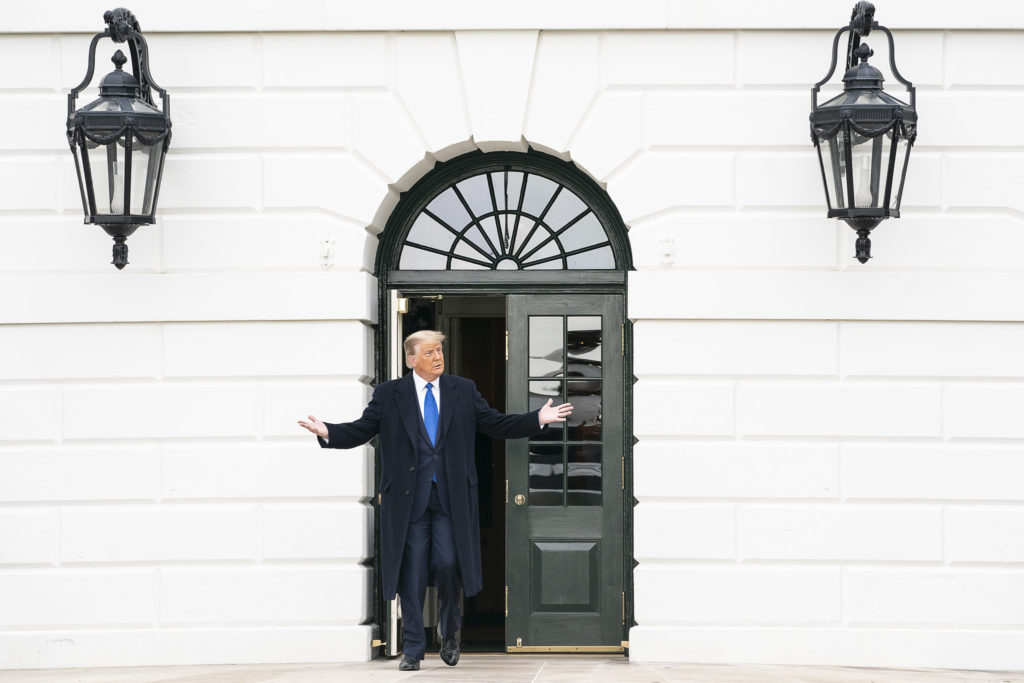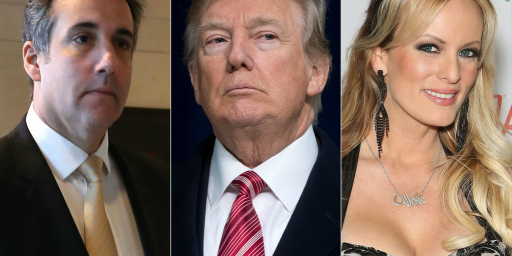Press Coverage and Team Trump’s Coup Talk
Or, more accurately, the lack thereof.

Over the weekend I noted two stories about highly disturbing conversations about actions that can only be characterized as coup-plotting (or, at least, coup fantasizing). The first was a clip of Michael Fynn on Newsmax actually suggesting a military coup to rerun the election in some states. The second was an NYT report about possibly using DHS to seize voting machines.
Let me note that I use the term “fantasizing” above not to downplay anything, but rather to simply note that for a coup plot to have any reality to it, the actors needed to pull off the coup, e.g., the military, DHS, etc., would have to actually have actors willing to help. As best I can tell, only Trump inner-circle types are willing to even discuss this stuff. People like Flynn, Giuliani, and Sidney Powell have all demonstrated themselves to be either delusional, grifters, or both. Dangerous fantasies are still dangerous, even if they have no real chance of happening.
Also, let me note that I have been part of the “not a coup” side of the semantic argument up to this point, so for me to start throwing around terms like “coup plot” and such is not hyperbole (and don’t let the title of my second post linked above (“Coup Plotting II: The Giuliani Boogaloo“) be interpreted as flippancy about the situation and think of it mores as gallows’ humor.
This situation is serious and the only comfort (and an important one) is that there is no path for a successful coup (hence my usage of “fantasizing” above). But let me be clear: to have a sitting president have a meeting in the White House wherein he entertains extralegal activities as a means of staying in power is a blight on our history no matter how low the probabilities of success might be.
I would note that the Flynn story, despite being simply a clip from Newsmax, is more disturbing than the NYT piece only because he is openly discussing a coup on video. There is no ability ro dismiss this as being the fruit of anonymous sourcing. He is not even being coy, but is saying the quiet part out loud. And the fact that he and his attorney (Powell) have been part of these meetings at the White House gives credence to the anonymous sources about the content of those meetings.
As such, the lack of urgency in reporting on this subject is disturbing. I noted the buried lede in the NYT piece in my post on Sunday (again, the notion that Trump considered/is considering naming Sidney Powell to be a special counsel is nuts and newsworthy, but it pales in comparison to the notion that Giuliani called DHS, perhaps at Trump’s behest, to discuss seizing voting machines).
All of this is preface to say that I agree with Eric Boehlert’s piece criticizing the NYT, and the pres in general, for their coverage of this story: Trump plots martial law from White House — the press shrugs.
Incredibly though, the Times did not run its martial law story on page one on Sunday. Instead it was tucked inside on page 28. (It was also buried on the paper’s website.) Additionally, the military coup aspect of the report — the fact the President of the United States might want to enlist armed players to destroy free and fair elections — wasn’t even included in the Times headline, or in the lede of the story.
[…]
It’s like the Normalizing Olympics — the press has spent four years turning often-seditious Trump behavior into 800-word stories that run on page 28.
The Times was not alone in basically shrugging a White House meeting that has likely never taken place in American history before. On Sunday morning, the Washington Post homepage included no mention of Trump considering the idea of imposing martial law. I couldn’t find a single major newspaper that ran the story on the front page over the weekend.
The piece goes on to note the lack of interest displayed on the Sunday Shows about any of this.
I recognize that the story in the NYT needs additional confirmation and reporting, but treating this as just another day in the life of Trump is, as Boehlert calls it, “the Normalizing Olympics.” This kind of activity cannot be treated as normal or a passing example of Trump being Trump. At a bare minimum, we need to be fully apprised of what it looks like when an emotionally stunted amateur is allowed into office and what can happen when he surrounds himself with loony sycophants. Moreover, we need to think through what might happen when a competent authoritarian with less loony sycophants sits behind the Resolute Desk.
Boehlerty correctly concludes:
All through Trump’s unprecedented crusade against democratic elections the press, time and again, has refused to acknowledge the severity of his actions and the deep Republican support he enjoys when he attacks the democratic process. It’s sadly fitting that after four years of failing to call out Trump, much of the press downplayed the White House talk of martial law. The normalizing never stops.
I know we all just want to move on. I know that reporting on Trump is exhausting and that we are in the time of the year wherein people are taking time off, but this is all very serious and demands more attention than it is getting.
Need I remind the Washington Post of their masthead slogan, “Democracy dies in the dark”? I guess I do.
Meanwhile, add these stories to the mix:
Via Axios: Trump turns on Pence, McConnell and White House counsel Cipollone in desperate final days.
And
Via CNN: Trump threatens 30-day reign of destruction on the way out of office.
I know we are all tired of Trump at this point, but we need to stay focused, as 30 days is a lot of time to do a lot of damage.






I recall Trump, in 2016, saying at one of his rallies something to the effect of “See those lights on the network cameras? When they come on, they are recording, and that’s how I know to say something outrageous.”
Right now, the outrageous thing to say, the thing that feeds the True Believers is that we’re gonna seize the election machines using the military. Or that we’re thinking about it. Or that we had a conversation about it. Oh guys, make sure when you “leak” this to the press you sound very, very concerned.
That’s my guess. I don’t know. That’s what makes this whole thing work – the ambiguity.
This sort of thing is very hard to figure out how to respond to. There isn’t a good answer. If you take it seriously, you’re getting hysterical. If you don’t, you don’t care. That’s its structure.
It’s a bit like the manipulative suicide threat. The response that psychological professionals have worked out, and use, with suicide threats is always take them seriously, but don’t act alarmed. If a patient drops a pointed hint, lean in and say, “tell me more”.
I’m not sure what the political equivalent to this is, and I’m quite clear that there are people who are much better at the political messaging thing than I am, but something along these lines seems important.
Flynn is quite a piece of work. Both delusional and a grifter, I think.
This article at Just Security, makes the point that the system didn’t work and the judges didn’t save us. Biden’s margin of victory was simply to great to allow any result but Biden becoming president on 1/20 to happen.
Of course we don’t know if the election results left Biden with a small victory that could have been flipped by disallowing a few thousand votes in one state, by the courts or a state legislature actually attempting to usurp the voters and replace the EC delegation. So yes the danger is out there.
This is the context where the lack of reporting in the general press about martial law fantasies damages or democracy.
People – even reporters – do not know how to metabolize the unexpected. In fact, most people can’t even see the unexpected.
@Sleeping Dog: That is a good piece, which I noted in passing yesterday in an update to my SCOTUS piece. It remains in an open tab for potential further comment.
@Michael Reynolds:
this is my favorite example of how little we notice.
@Jay L Gischer:
The proper way is ridicule. But I imagine the supposedly liberal MSM feel they have to treat the office with dignity, even if the occupant doesn’t. And they seem terrified of the right, for reasons I’ve never fully understood.
@Michael Reynolds: The maddening thing is this isn’t unexpected. You predicted it. Virtually every DFH lefty blogger predicted it. WAPO, god bless them for that, has counted 25,000 lies. They’ve had four years to figure this out and the best they can manage is to footnote absolute lies about the election.
I think the semantic distinction here, while I understand why academics and intellectuals make it, in some ways helps lose sight of the bigger picture. It’s kind of like debating whether the 9/11 hijackers were suicide bombers–it’s getting into a definitional debate over something where there’s no dispute about the ultimate outcome. Imagine the SCOTUS had reacted to the Texas lawsuit by agreeing with the Trump team and ordering the results in all those states thrown out, after which the legislatures would vote for Trump and he’d win the EC. Would that have been a coup? Maybe not. But one thing would be certain, and that’s that American democracy would be dead.
Here’s my simple, knee-jerk, layperson’s criterion for defining a “coup”: if the country afterward can no longer be described as a democracy, it’s a coup.
@Kylopod: I get that. It like the fact that most lay people talk about the “stomach flu” when it isn’t a flu at all.
But while “stomach flu” conveys the idea, you want your doctor to understand that it is something else entirely if you want proper treatment.
@Kylopod: I will also double-down (in a friendly tone, to be sure) that it matters for someone like me to engage in the semantics and proper diagnoses because it lends weight (I think) when people like me are willing to start using specific terms.
@gVOR08: I am quite clear that the proper response to the manipulative suicide threat is not ridicule. But you weren’t talking about that.
No, I don’t like ridicule. It pushes away people whose vote and support might otherwise be available. Let us not forget that one of Trumps big selling points was “the system is rigged against you”. Which it is. I think it is, I bet you do too.
In the Rod Dreher piece someone linked to a couple days ago, he repeatedly said that “churches are going to break over this. Churches are breaking”. This presents opportunity, but we need to not push away the people who might be questioning their association with the “God spoke to me personally” coup cult.
So, that wedge needs to be driven deeper. Don’t drive them together, drive them apart. If you aren’t part of the groups that are breaking, you’re going to have a very hard time doing the sort of surgically precise ridicule that might work to drive that wedge deeper. I think a posture of leaning in and saying, “tell me more” is far more effective and inviting.
@Steven L. Taylor: I get the importance of certain semantic distinctions that laypeople often ignore, and I’ve been insistent on some of those distinctions myself in the past. The problem is when such a distinction has the effect of detracting from the seriousness of the situation. If we’re looking at the possible end to American democracy, that’s a very serious situation that debates over whether it’s a coup, autogolpe, or something else tend to diminish. I don’t think it would be a whole lot better if it were achieved through the courts rather than through overt military action, and in some ways the Texas lawsuit was more precarious than where we are now because it had (I believe) a relatively greater chance of success.
@Kylopod: Sure, but I also think that a lot of why we are where we are is due to a whole lot of imprecision in understanding our own politics (see, e.g., ”
a republic, not a democracy” among a myriad of other examples).
I think it important to distinguish between an attempt to use legal processes to subvert democracy (if not to steal the election) as per the Texas case versus using extralegal means to seizes balloting machines in an attempt to rerun an election.
To be go back to the medical analogy: the diagnosis dictates the treatment.
But, granted, I am now 30 years removed from getting my BA and starting grad school–I am impossibly doomed to think this way 😉
@Kylopod:
Indeed. But dying of heart disease or a bowel obstruction are both bad, but I surely want my doctor to know the difference to help stop me from dying.
@Steven L. Taylor: When we have Democracy Doctors, then that will be relevant. I think the solutions are more situational, and the classification doesn’t help. The solutions depend more on whether he has a chance of pulling it off.
Further, the “it’s not a coup, it’s an auto-golpe” argument sounds like “he’s not a pedophile, he’s a ephebophile” — you’re unlikely to want to use the guy as a baby sitter in any case.
@Steven L. Taylor: I think when political scientists who know what they are doing (like, presumably, you*) start using the well-known scary terms it has an effect. Whether the well-known scary term is being used precisely correctly or not.
*: how could I tell if you were the Dr. Nick of political science? I don’t think you are, but what do I know?
@Gustopher:
We actually do, but people don’t pay them much mind (by people, I meant the broader population). Instead, they listen to pundits.
After spending the last four years catastrophizing every Trump action, it does seem weird that in this instance the media isn’t giving it the coverage it deserves. This is important enough to merit being on the top-10 list of bad stuff Trump or his cronies have said/done despite it being, as you note, a complete fantasy/delusion.
I’ve long been one who primarily focuses on the importance of actual actions and not mere words or rhetoric (particularly when it comes to Trump’s tendency to bullshit and troll), but any discussion of using violence to achieve political ends should always be incontrovertibly and decisively condemned. Without exception.
@Steven L. Taylor:
But that just gets to how loose the concept of “legal” is when you’re talking about people given the authority to define what’s legal. The law is whatever the judiciary says is the law, and only a later ruling or a constitutional amendment can reverse it, while the people who hand down these rulings, no matter how absurd or manufactured, face no consequences whatsoever (apart from the almost impossible long shot of impeachment and removal from the bench).
If SCOTUS had ruled in favor of the Texas lawsuit, and it had led to Trump being installed by the EC for a second term, democracy would be dead in this country. At that point, any time a Republican lost a federal election they could just run crying to the SCOTUS, which would proceed to anoint them the winner based on the thinnest legal pretext or no pretext at all. The Republicans would then proceed to pack the courts even further, and rig the voting system up the wazoo, all with the SCOTUS’s blessing. The SCOTUS chose not to end American democracy a couple of weeks ago, but they absolutely had the power to do so. That to me is a far more worrying fact than the prospect of a military coup at this point.
@Gustopher:
I got denied admission to Hollywood Upstairs Medical College
@Kylopod:
It may be a bit worse than that. Thomas and Alito seem open to doing that. I don’t know about Coney Barrett. Gorsuch and Roberts seem likely to do the right thing.
I don’t give the media a pass for the past 6-7 years of Trump coverage, but I would point out that Trump is always big-chesting about what he’s going to do, and never does it. It’s clear these court challenges do nothing but allow him to raise money from idiots.
I’ve said before Trump isn’t the threat anymore. One month from now he’s a private citizen again and back in New York State where the legal system has a lot of questions for him. He’s done and dusted.
But the post-Trumps are another matter. The press should be looking around for them with an eagle eye.
Trump won’t stage a coup, because such things require advance planning and attention to detail. They also require a base of support among the armed forces and high government officials. You can’t just decide to stage a coup one day and carry it out next week, if you don’t plan to be golfing that day.
The time to plan a coup was all the way back in January of this year, or even earlier, as a contingency against an election loss. but trump can’t plana head, or conceive of losing.
This should illustrate to his supporters just how incompetent he really is: even losers in s**thole countries, to use Trump’s own terminology, manage to stage coups successfully and remain in power as long as they like. Trump can’t rise to that level. He’s not even as sharp or smart as Hugo f***g Chavez.
For instance, martial law is a serious thing undertaken as a last resort, not a handy gimmick you can just pull out when you need it. It takes serious unrest or outright rebellion, it takes calls by local officials for assistance, and it takes steps from curfews to calling the national guard to calling in regular troops.
Trump could have arranged that, by having his Proud Boys and other nazis-at-heart riot and carry on as though they truly believed the election was stolen from them. but he doesn’t control these groups and he has set up none of his own (sloppy).
@Kurtz:
I know you’re referring to the Texas lawsuit specifically, but we need to be careful about claiming any of these justices will “do the right thing” given their history of not doing the right thing. What their ruling on the Texas case proved most of all was that their well-established willingness to trash American democracy has limits.
The Trump team no doubt overplayed their hand, but that’s only because they had no strategy more sophisticated than the Chewbacca Defense (which happens to be the essence of the entire legal strategy in Trumpworld, not just regarding elections–you also saw it during the impeachment). Their arguments approach totally incoherent gibberish, but they just continue spewing them loudly and incessantly at every opportunity and mark it as a success if most people come out of it simply puzzled. It’s a strategy that can help achieve certain political goals, but it’s not likely to work in court unless it involves judges who will rubber-stamp literally anything Republicans give them, and we have not quite reached that point yet.
@Kathy:
Very true, and what scares me. Trump’s Keystone Kops Koup has no chance of succeeding. But he’s sure given a more competent future Republican asshat a lot to think about.
@Kurtz:
I don’t think it’s quite that bad. Both of them apparently have a long-held position that the Court can’t — or at least shouldn’t — dismiss original jurisdiction cases for standing. Alito wrote, “I would therefore grant the motion to file the bill of complaint but would not grant other relief, and I express no view on any other issue.” Effectively, that the Court should have let them file and then dropped the hammer on them.
@Kylopod:
The issue with several of Trump’s lawsuits was timeliness. Several of those suits, if they had been filed when state election boards or legislatures changed the rules during the summer, it would have been likely that the courts would have provided Trump w/relief and narrowed the opportunity for people to vote.
@Michael Cain: @Michael Cain: I’m more worried about the Pennsylvania case which the court turned down, noting that time was up but PA was segregating subject ballots, holding the door open for future action. In a “statement that reads much like a dissent”, whatever the heck that means, Alito, Thomas, and Gorsuch held that the PA Supreme Court action extending the deadline may be unconstitutional because the originalist Ouija board may decide only the state legislature can decide election issues.
So far, we’re being saved by two things. First, the Roberts principle – C’mon guys, you gotta give me something to work with. Second, the cases brought didn’t involve enough votes to overturn the result.
@Sleeping Dog:
I agree, but that has to do with the fact that there’s a great difference in perceptions of legitimacy when you place obstacles in the path of someone getting the opportunity to vote vs. throwing that person’s vote away after it’s been cast. A lot of people who would object to the latter are fine with the former–or at least don’t think of it as being as clearly undemocratic, even if it leads to the same outcome. That’s why I said the justices’ willingness to trash democracy has limits. They are manipulating the voting system to make it less representative of the public because they know it will help those they support maintain power, but they do it in a way that allows them to tell themselves and others they’re respecting the institutions.
@Steven L. Taylor: If we have Democracy Doctors, they aren’t doing shit. I think we might have Democracy Cassandras, even though it isn’t alliterative.
And we certainly don’t have a Democracy Brutus (which might just be a Brutus…) in the Trumposphere.
Et tu, Jarvanka? will not be uttered until they flip on him and cooperate with prosecutors to avoid jail time.
@Teve:
this is my favorite example of how little we notice.
@gVOR08: That one’s not going to change the outcome. It’s also the only one I know about where there’s a principle that the SCOTUS has historically applied to itself that it’s likely to apply to a state supreme court. The SCOTUS has very consistently said that changing numbers is almost always off limits: if the statute says five, courts may not substitute six. In this case, the statute sets a hard date and the Pennsylvania supreme court said, “No, that date plus three days.” Not two days, not four days, but three days. My guess is the SCOTUS says they can’t do that in the future, but won’t touch ballots cast in good faith.
Well played.
@Andy:
I have no idea which media outlets you follow routinely, but every one I have seen (with the possible exception of Mother Jones) has consistently downplayed the norm-breaking, sedition, flagrant corruption, and general destruction of the executive branch implicit in Trump’s various actions and statement. Which particular “catastrophizing” did you have in mind?
@DrDaveT:
I guess the only thing I would say in response is that I find the notion that the entire press except for (possibly) Mother Jones has gone easy on Trump is certainly a novel argument.
@gVOR08:
The worst thing Trump’s done is show a future authoritarian how far the GOP, and tens of millions of voters, will go along with tyranny when accompanied by prejudice.
@Kathy: I saw yesterday a conservative nutcase insist that on January 6, Mike Pence should just discard the certified votes for Biden in the swing states. When it was pointed out that the constitution has no provision for doing such a thing, the nutcase said that the constitution didn’t expressly prohibit Pence from discarding votes, so therefore it is permitted.
It doesn’t just give them credibility, it poses the question of what other possible reason there could be for Trump to have invited Flynn and Powell to a long meeting in the Oval Office. Of course they were there because Trump wanted to hear more about their proposals to overturn the election outcome, because he’s convinced he won.
The mistake I see in one comment after another, in countless discussion threads, is that people assume Trump’s motives and objectives are capable of rational explanation. They’re not. He’s off his head, and has been for years. Once you actually accept this simple truth, you stop tearing your hair out trying to understand why he does things, because there is no “why”. Crazy people don’t need “whys”.
Trump believes he won the election. He believes it’s being stolen from him by people massively inferior to him in every way. Therefore he might do all sorts of mad things to hurt them and help him reclaim what is his. Rational cause/effect analysis of his actions is ludicrous, like trying to describe the thought processes of a volcano.
I’ve long believed the media and the political establishment in general have closed their eyes to Trump’s madness because its implications are too horrendous to cope with. It’s like people confronted with evidence their spouse or child is a rapist or serial killer; accepting the evidence would require such a traumatic upheaval in their lives that it is literally unthinkable. Therefore they simply dismiss it as not possibly true.
It will be many years before Americans can place the Trump presidency and the Trump Cult in some kind of accurate historical perspective. One can only hope they are allowed such a period of grace before they have to deal with another, worse attack on democratic governance.
It doesn’t matter whether Trump is crazy or not — he’s spent his “business” life cheating and getting around laws, so he looks at the election as yet another regulation to find the loophole to use to get around it.
@Ken_L: Trump has patterns, whether they conform to what one might call “rationality” is its own conversation about what that fraught term means.
And yes, he clearly has diagnosable mental disorders. Those, too, lend themselves to certain behaviors and patterns. I don’t think he is random in his actions.
@Andy:
No, it isn’t. If nothing else, many of the commenters here have been saying it for 4 years now. The only people (apart from you, apparently) who think the press haven’t been sufficiently critical of Trump are the people who think the press should have been praising him instead.
For instance, if you go back and read the coverage of the Ukraine call, skipping the opinion/editorial pages, it’s almost impossible to find language that explicitly asserts that Trump did something wrong, much less that it was egregious. The President of the US shook down a foreign country for political favors, and the response of the press was to note that Democrats were upset by the call but Republicans were not. Hard to say that doesn’t qualify as “going easy on him” and it’s perfectly typical of the first 3+ years of his term.
@DrDaveT:
Gah, typo — that should be “who think the press have been sufficiently critical…”